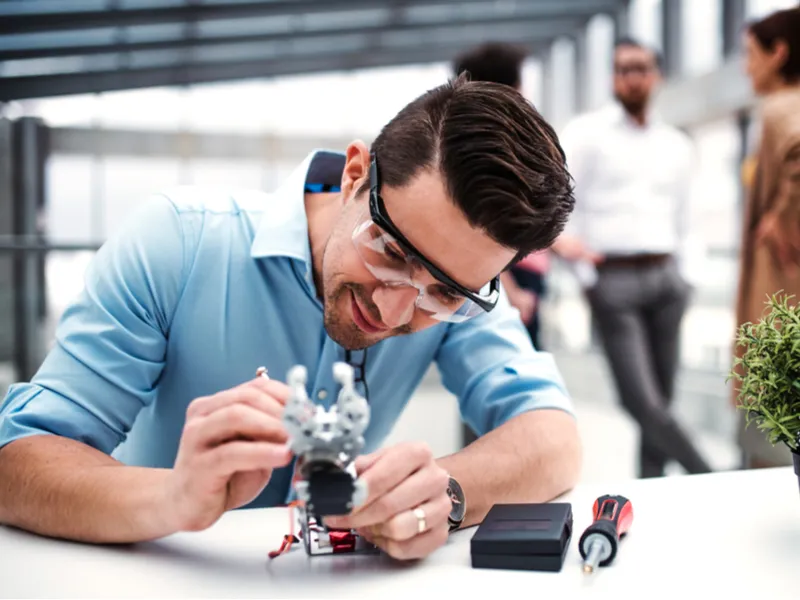
An inventor is a creative and innovative individual who generates new ideas, concepts, or products, or significantly enhances existing ones through modifications or improvements. These individuals are driven by a natural curiosity, an innovative mindset, and a strong desire to solve problems or improve the way things are done. They possess a unique ability to think outside the box, identify patterns, and connect seemingly unrelated concepts to create novel solutions.
Inventors can be found in a wide array of fields, including technology, engineering, science, design, and even the arts. They may work independently as individual innovators or collaboratively within research teams, universities, or companies. Their motivation for inventing can stem from various factors, such as financial gain, recognition, or a genuine passion for making a difference in people's lives.
The invention process is often a complex and iterative journey that involves several stages, including research, experimentation, prototyping, and testing. Inventors must have a deep understanding of the problem or opportunity they are addressing, as well as the relevant technical and scientific principles. They must be able to analyze and interpret data, identify trends, and synthesize information from multiple sources to inform their inventions.
Inventors may need to navigate a myriad of legal and business considerations throughout the invention process. For instance, they may need to secure patents to protect their intellectual property rights, or negotiate licensing agreements with manufacturers or distributors to bring their inventions to market. These aspects of the invention process can be as complex and challenging as the technical aspects, requiring inventors to possess strong communication, negotiation, and entrepreneurial skills.
Throughout history, inventors have made significant contributions to society, driving progress and transforming the way people live, work, and interact with the world. From groundbreaking inventions like the wheel, the printing press, and the steam engine to more recent innovations such as the Internet, smartphones, and renewable energy technologies, inventors have shaped the course of human history and will continue to do so for generations to come.
Inventor versus Innovator
An investor and an innovator are two different roles that often work together in the development and growth of a new idea, product, or company.
An innovator is a person who creates or discovers a new idea, device, or method, or makes significant improvements to existing ones. Innovators are often focused on the creative and technical aspects of developing a new product or service, and may work in a variety of fields, including technology, engineering, science, and design.
An investor, on the other hand, is a person or organization that provides financial resources to support the growth and development of a new idea, product, or company. investors are often focused on the financial aspects of a new venture, and may provide funding in exchange for equity or ownership in the company.
While innovators and investors have different roles and responsibilities, they often work together to bring new ideas to market. Innovators may seek out investors to provide the financial resources needed to develop and scale their ideas, while investors may seek out innovative new products or services to invest in.
In some cases, an individual may act as both an innovator and an investor, such as when an entrepreneur develops a new product or service and invests their own money to bring it to market. However, the roles of innovator and investor are distinct and require different skills and expertise.
Famous Inventors
Alexander Graham Bell (1847-1922)
- Invented the telephone in 1876, revolutionizing long-distance communication
- Also developed the audiometer and photophone to aid people with disabilities
Marie Curie (1867-1934)
- Polish physicist and chemist, discovered the elements radium and polonium and coined the term "radioactivity"
- First woman to win a Nobel Prize, and the first person to win Nobel Prizes in two different fields (physics and chemistry)
Thomas Edison (1847-1931)
- Prolific inventor, credited with over 1,000 U.S. patents including the first commercially viable incandescent light bulb
- Also invented the Universal Stock Printer, quadruplex telegraph, and phonograph
Nikola Tesla (1856-1943)
- Designed the alternating current (AC) electrical system still used worldwide today
- Invented the Tesla coil, which is still used in radio technology
Garrett Morgan (1877-1963)
- Invented the three-position traffic signal, improving road safety by regulating traffic flow
Hedy Lamarr (1914-2000)
- Invented a radio guidance system for torpedoes using frequency-hopping technology, which later led to the development of Wi-Fi and Bluetooth
Tim Berners-Lee (b. 1955)
- English engineer and computer scientist, credited with inventing the World Wide Web
These inventors made groundbreaking contributions across a wide range of fields, from telecommunications and transportation to physics, chemistry, and computer science. Their innovations have had a profound and lasting impact on society.